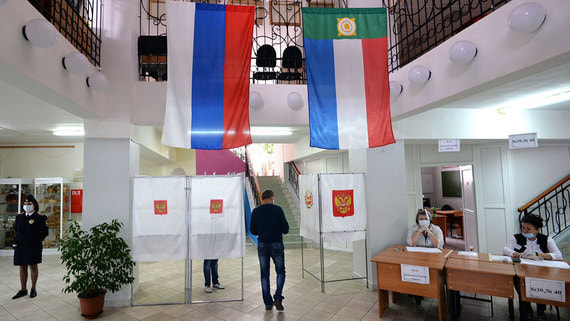The United Russia faction in the parliament of Khakassia will become more homogeneous and manageable
[ad_1]

United Russia (UR) received 68% of the mandates in the Supreme Council of Khakassia, said Andrei Turchak, Secretary of the General Council of the party in power, at a joint meeting of the bureau of the Supreme Council and the Presidium of the General Council following the results of a single voting day on September 10. “Our team focused on the elections to the Supreme Council and City Council of Abakan. 36.4% of voters voted for the party list [в верховный совет]. At the same time, we took 23 out of 25 single-member constituencies,” he said. The list of the Communist Party of the Russian Federation received more votes (39.11% versus 36.41% for United Russia), but the communists won only in two single-mandate constituencies.
As a result, United Russia received 34 mandates in the 50-seat parliament of Khakassia. The Communist Party of the Russian Federation received 14 mandates and the Liberal Democratic Party received two. In the Supreme Council of the republic of the previous convocation, twice as many factions sat: in addition to United Russia (there were 17), the Communist Party of the Russian Federation (16) and the Liberal Democratic Party of Russia (8), “A Just Russia”, “Communists of Russia” and “Patriots of Russia” were represented there.
According to a Vedomosti source close to the region, since 2018, the head of the republic, communist Valentin Konovalov, was able to “maneuver”, including due to the fact that the speaker of the Supreme Council Vladimir Shtygashev, although he was a United Russia member, largely defended his interests without always focusing on the advice of the center, like a number of his “allies in parliament.”
State Duma deputy, participant in the special operation Sergei Sokol, despite withdrawing his candidacy from the elections for the head of Khakassia for health reasons (this happened less than a week before the start of the three-day vote), continued to lead the United Russia list in the elections to the Supreme Council. Vedomosti’s interlocutor, close to the regional parliament, is confident that Sokol will become its chairman (RBC wrote about this before the elections). Shtygashev, who had been head of parliament since the early 1990s, left United Russia in mid-June and ran for the new convocation from the Communist Party of the Russian Federation. A number of his fellow deputies did the same.
In the United Russia faction in the new convocation there will not be such contradictions as existed before the elections, says political scientist Vitaly Ivanov. “In general, the faction is Sokolovsky. Managed, united,” he says. Political scientist Alexander Kynev believes that the structure of the Supreme Council of Khakassia “turned out to be simpler than it was before”: due to “the extremely high polarization that was in the elections, all the votes were concentrated at the poles and only three factions were formed.” “The United Russia itself has never been homogeneous in the region. In regional politics, personal connections and personal relationships are important. There is no doubt that a number of United Russia members were supported by the regional administration. We need complex bargaining, everyone should understand this,” he told Vedomosti.
Nevertheless, now the Supreme Council of Khakassia is in opposition to Konovalov, who was re-elected to his post without the participation of his main competitor Sergei Sokol in the elections. In such a situation, parliament can block Konovalov’s initiatives or legally oblige him to coordinate personnel decisions with deputies, as was the case in the Vladimir region during the governorship of Vladimir Sipyagin (LDPR) in 2018–2021.
[ad_2]
Source link








